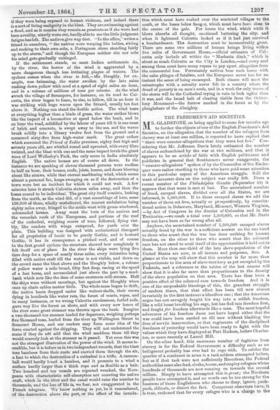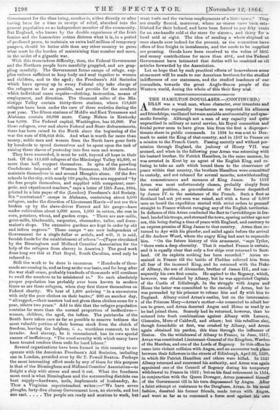an hour the road, solidified by the labour of years
till it is one mass R. GLADSTONE, on being applied to some few months ago
of brick and concrete, is swept away to the sea, and the waves to further the objects of one of the English Freedmen's Aid break solidly into a library twelve feet from the ground and a Societies, on the allegation that the number of the refugees from Government for the time being, another is, either directly or after baring bean for a time in receipt of relief, absorbed into the general population as ae independent member of the community. But England, who knows by the double experience of the Irish famine and the Lancashire cotton distress what it is, in a period of profound peace, to maintain an extra balf.million of temporary paupers, should be better able than any other country to guess what must be the burden of maintaining that number and more, in the midst of a gigantic war.
With this tremendous difficulty, then, the Federal Government and the Northern people have manfully grappled, and are grap- pling manfully. The Government forms camps of refuge, sup- plies rations sufficient to keep body and soul together to women and children, and to the aged ; the Freedmen's Aid Societies which have sprung up in every Federal city take charge of the refugees as far as possible, and provide for the comforts which individual cases require—clothing, instruction, means of employment, and direction. The thousand miles of the Mis- sissippi Valley contain thirty-three stations, where 113,650 refugees have been under the care of these societies during the past year. The fifteen stations of Middle and East Tennessee and Alabama contain 50,000 more. Camp Nelson in Kentucky has 8,000. The Federal capital, Washington, has 25,000. For these refugees, over and above Federal and State disbursements, there has been raised in the North since the beginning of the war the sum of 630,044 dole. And what is worth far more than money, noble men and women from the North have gone forth by hundreds to spend themselves and be spent upon the task of raising these slaves of yesterday into free men and women.
They have succeeded, it must be said, beyond all hope in their task. Of the 113,650 refugees of the Mississippi Valley 62,300, or more than half, support themselves. In spite of the prowling Confederate brigands of Western Tennessee, 10,000 freedmen maintain themselves in and around Memphis alone. Of the five schools in the city, with nearly 700 pupils, three are supported "by the free people themselves, and supplied with competent, ener- getic, and experienced teachers," says a letter of 15th June, 1864, printed in a late paper of the (London) Freedmen's Aid Society. Six " contraband " camps in Alabama, containing about 5,000 refugees, under the direction of Lieutenant Harris—if not ere this broken up by the slave-driver Forrest and his gangs—have under cultivation about 2,000 acres, 1,000 in cotton, the rest in corn, potatoes, wheat, and garden crops. " There are saw-mills, grist-mills, blacksmith, carpenter, shoemaker, tailor, and dress- maker's shops. The extensive gardens are kept in order by old and infirm negroes." These camps " are now independent of Government for a single dollar or• article, and will, it is said, furnish funds for the establishment of others."—(Paper circulated by the Birmingham and Midland Counties Association for the help of the refugees from slavery in America.) The good work done long ere this at Port Royal, South Carolina, need only be referred to.
Still the work to be done is enormous. " Hundreds of thou- sands are coming in, and as long as the war lasts, and for• long after the war shall cease, probably hundreds of thousands will continue to swell the numbers to be ministered to." No such absolutely pauper population has probably ever been known in modern times as are those refugees, when they first throw themselves on Federal charity. We hear of 1,000 arriving " in a snowstorm with only the poor clothes on their backs ;'' 900 on another day, " all ragged,—their masters had not given them clothes some for a year, others two years." Add to this that the refugee population contains far more than the normal proportion of ineffectives- women, children, the aged, the infirm. The patriarchs of the South have taken care as far as possible to remove betimes the
most valuable portion of their human stock from the clutch of freedom, leaving the helpless, i. e., worthless remnant, to the invader. And slavery, be it remembered, has its own special causes of inefficiency. "The cruel severity with which many have been treated renders them unfit for hard labour."
Several organizations have been formed in this country to co- operate with the American Freedmen's Aid Societies, including one in London, presided over by Sir T. Fowell Buxton. Perhaps the most interesting effort made by any of them for this purpose is that of the Birmingham and Midland Counties' Association—to freight a ship with stores and send it out. What the freedmen
most need is what Birmingham and the surrounding districts can beat supply—hardware, tools, implements of husbandry, &c. Thus a Virginian superintendent writes :—" We have seven
ploughs, forty-five clumsy Government hoes, no shovels, and but
one cart The people are ready and anxious to works but want tools and the various employments of a little town." They are cruelly fleeced, moreover, where no stores have been esta- blished for their behoof, and have been forced to pay fifty cents for an axe-handle sold at the store for sixteen, and thirty for a bowl sold at eight. The idea of sending a whole shipload at once stands over indeed for the present, as the coinmittee have offers of free freight in instalments, and the needs to be supplied are pressing. Goods have been received to the value of 3501 and money contributions for more than 4001., and the Federal Government have intimated that duties will be remitted on all articles forwarded by the Association.
Let us hope that by such practical efforts of benevolence some atonement will be made to our American brethren for the studied indifference of our statesmen, and the studied insolence of our journalists, towards the great Anglo-Saxon people of the Western world, during the whole of this their fiery trial.































 Previous page
Previous page